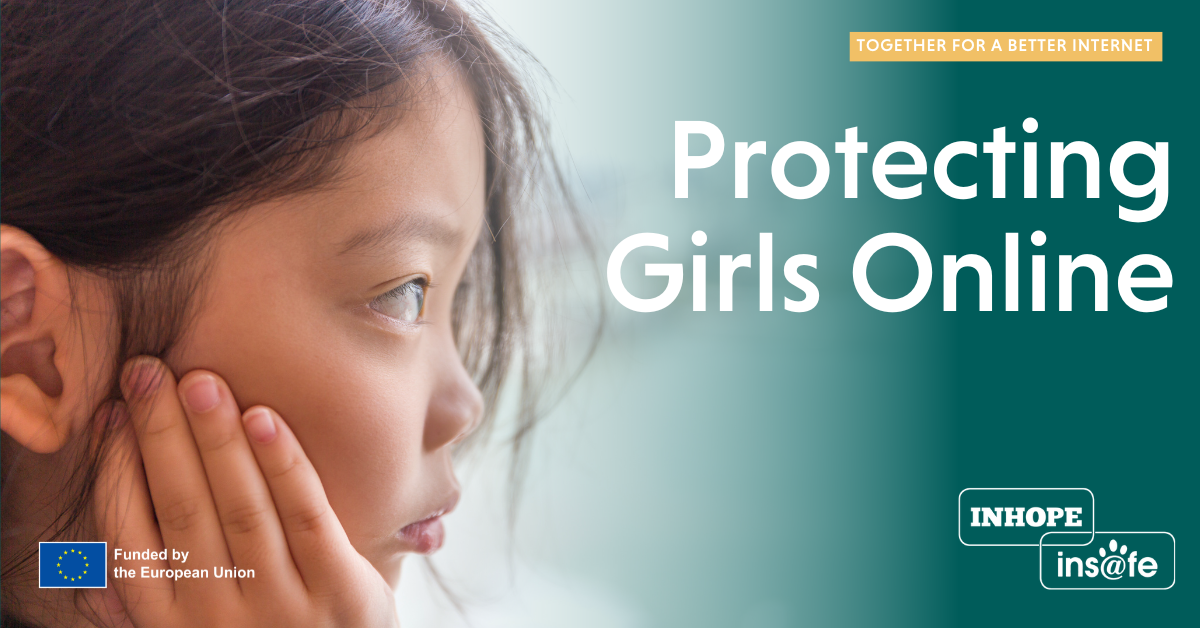Article
Events & Campaigns
Industry News & Trends
Protecting Girls Online
Any minor can be the victim of child sexual abuse and have material of that abuse shared online. Abuse happens to children of all ethnicities and ages, economic statuses or positions in society.
Nonetheless, statistics and trends reported by INHOPE member hotlines demonstrate, that some demographics are more vulnerable than others. While offenders can target children of any gender, girls remain at much higher risk, with over 90% of reported cases involving female victims. Year after year, the overwhelming majority of reports processed by hotline analysts depict children identified as female, with the main age group being 3 to 13. But why is that and what can we do to protect young girls online?
The Impact of Sexualisation in the Media
One factor contributing to the vulnerability of girls to sexual abuse is the sexualisation of women in media and advertising. Repeated exposure to over-sexualised content online may result in young people valuing their self-worth exclusively through their sexuality and physical appearance, which can result in body-image issues and insecurities. Research suggests girls are significantly more likely to internalise the body ideals they see in media, leading to deep dissatisfaction with their appearance.
More than half of the girls surveyed shared that seeing images on social media has caused them to worry about their body image, with 26% this number is significantly smaller for boys. So, while children of all genders can be negatively affected, the threat to girls is significantly heightened. This can increase girls' vulnerability to abuse, as bad actors online often target girls displaying signs of low self-esteem to gain their trust through compliments and attention to later exploit them for sexual purposes.
Action for change
To counteract the exposure to problematic materials online, it is critical to teach young digital users in general that media and the internet mostly don't reflect reality. Having open and honest conversations with young people about gender equality and healthy sexual development is essential in supporting them to grow up safe online and offline. Teaching young girls not to rely on male validation to feel confident in their skin could decrease the risks of them falling victim to grooming tactics online.
Deconstructing Harmful Stereotypes
Our society is making big leaps in deconstructing gender stereotypes and promoting gender equality. However, certain gender stereotypes are so deeply ingrained in our culture that major discrepancies in power dynamics between men and women still remain. To this day, women and girls are more likely to be seen as weaker, and more vulnerable, while men often feel like they are required to act tough, strong and dominant. Often subconsciously influenced by media, our society normalises the act of dominance and aggression against women by showcasing them as objects of pleasure. When young boys internalise that message it can inadvertently influence how they view girls and women. This could also contribute to the high number of female sexual abuse victims.
Action for change
If we want to protect young girls, we need to tackle the issue at the root and begin deconstructing these harmful stereotypes. We must teach young boys that it is good to be vulnerable, to open up about their feelings and that being perceived as tough and dominant are less important than being respectful and kind. Similarly, we must teach young girls to be confident, strong and independent to equip themselves with the necessary resilience to safely navigate through the world.
Keeping Girls Safe Online
The sexualisation of women in our society, and the increasingly early access to technology and social media have made young girls more vulnerable to sexual abuse and exploitation. It is crucial that we recognise and address these underlying factors in our efforts to keep children safe from abuse online.
This includes regulating and monitoring online platforms and providing support and resources to victims of abuse. Everyone, but especially young people must be equipped with knowledge on how to recognise signs of grooming, how to protect themselves against NCII abuse and where to ask for help. Only through collaborative efforts and by tackling the issue at the root can we keep young people safe online.
If you’ve come across sexual content of yourself or another minor, contact your local hotline to have it removed by clicking here.
Safer Internet Day would not be possible without the support of the European Union. Currently, the funding is provided by the Connecting Europe Facility programme (CEF). In the future, actions will be funded through the Digital Europe Programme (DIGITAL). Find out more about the European Commission’s new European strategy for a better internet for kids (BIK+) on the EC website.

The sexualisation of women in our society and the increasingly early access to technology and social media have made young girls more vulnerable to sexual abuse and exploitation
'